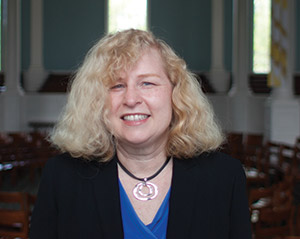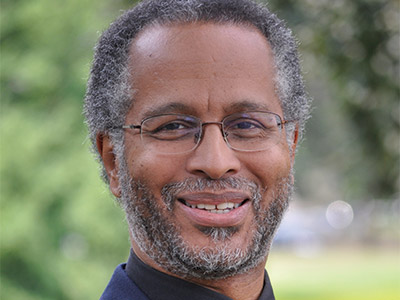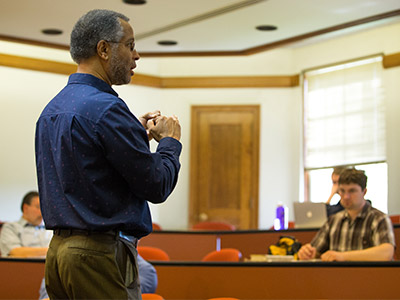Three Faculty Members Receive Tenure
Following a thorough review process, the Board of Directors has granted tenure to three faculty members at Pittsburgh Theological Seminary: the Rev. Dr. Angela Dienhart Hancock, the Rev. Dr. R. Drew Smith, and the Rev. Dr. Heather Hartung Vacek.
“Each of these faculty members is a well established scholar and widely respected as a leader in her or his field. The granting of tenure is not only an acknowledgement of their excellent scholarship and dedicated service, but it also marks the commitment of Pittsburgh Seminary to their fields of study and to the diversity they represent,” said the Rev. Dr. David Esterline, president and professor of cross-cultural theological education at Pittsburgh Seminary.
A Presbyterian, Baptist, and Moravian, Drs. Hancock, Smith, and Vacek are a practical theologian, social scientist, and historian, respectively. They presented disciplines not covered among the current tenured faculty. Their published works on topics such as Barth, homiletics, urban church, black church, and mental illness demonstrate the Seminary’s commitment to context as a learning partner.
 Hancock serves as associate professor of homiletics and worship. She is an ordained Minister of Word and Sacrament in the Presbyterian Church (U.S.A.) and has served as pastor to churches in Pennsylvania, Kentucky, and Tennessee. Hancock earned her bachelor’s degree in music from Indiana University, Bloomington, and her M.Div. and Ph.D. from Princeton Theological Seminary, where she won prizes in preaching and church music. She is the author of Karl Barth’s Emergency Homiletic, 1932-33: A Summons to Prophetic Witness at the Dawn of the Third Reich, a contextual interpretation of Swiss theologian Karl Barth’s lectures on preaching in the early 1930s based on unpublished archival material. Her most recent research project assesses Karl Barth’s potential contribution to the practice and ethos of deliberation in Christian communities in democratic contexts. Hancock’s scholarly interests include systematic theology, homiletics, liturgical theology, rhetoric, history, political theology, and philosophical hermeneutics. Hancock continues to preach, teach, and lead worship in a variety of settings.
Hancock serves as associate professor of homiletics and worship. She is an ordained Minister of Word and Sacrament in the Presbyterian Church (U.S.A.) and has served as pastor to churches in Pennsylvania, Kentucky, and Tennessee. Hancock earned her bachelor’s degree in music from Indiana University, Bloomington, and her M.Div. and Ph.D. from Princeton Theological Seminary, where she won prizes in preaching and church music. She is the author of Karl Barth’s Emergency Homiletic, 1932-33: A Summons to Prophetic Witness at the Dawn of the Third Reich, a contextual interpretation of Swiss theologian Karl Barth’s lectures on preaching in the early 1930s based on unpublished archival material. Her most recent research project assesses Karl Barth’s potential contribution to the practice and ethos of deliberation in Christian communities in democratic contexts. Hancock’s scholarly interests include systematic theology, homiletics, liturgical theology, rhetoric, history, political theology, and philosophical hermeneutics. Hancock continues to preach, teach, and lead worship in a variety of settings.
 Smith earned his undergraduate degree from Indiana University, and earned his M.Div., M.A., and Ph.D. from Yale University. Both a political scientist and a clergyman, he has initiated and directed a number of projects related to religion and public life, which have collected research data on political involvements, community development activities, and outreach ministries of churches, especially African-American churches. He has also conducted similar research in South Africa, including while serving in 2005 as a Fulbright professor at the University of Pretoria. His global involvements also includes serving in 2009 as a Fulbright senior specialist at Presbyterian Theological Seminary in Cameroon, and lecturing in many international venues including as part of the U.S. State Department’s Speakers Bureau. He has served since 2010 as co-convener of the Transatlantic Roundtable on Religion and Race, an initiative that convenes scholars, religious leaders, and community activists from across the transatlantic region for purposes of advancing progressive approaches to persistent racial problems in various contexts. In addition, as a Baptist clergyman, he has ministered in a number of parish, prison, and campus ministry contexts. He’s the author of editor of eight books, the latest titled Religion, Culture, and Spirituality in Africa and the African Diaspora (Routledge, 2017).
Smith earned his undergraduate degree from Indiana University, and earned his M.Div., M.A., and Ph.D. from Yale University. Both a political scientist and a clergyman, he has initiated and directed a number of projects related to religion and public life, which have collected research data on political involvements, community development activities, and outreach ministries of churches, especially African-American churches. He has also conducted similar research in South Africa, including while serving in 2005 as a Fulbright professor at the University of Pretoria. His global involvements also includes serving in 2009 as a Fulbright senior specialist at Presbyterian Theological Seminary in Cameroon, and lecturing in many international venues including as part of the U.S. State Department’s Speakers Bureau. He has served since 2010 as co-convener of the Transatlantic Roundtable on Religion and Race, an initiative that convenes scholars, religious leaders, and community activists from across the transatlantic region for purposes of advancing progressive approaches to persistent racial problems in various contexts. In addition, as a Baptist clergyman, he has ministered in a number of parish, prison, and campus ministry contexts. He’s the author of editor of eight books, the latest titled Religion, Culture, and Spirituality in Africa and the African Diaspora (Routledge, 2017).
.jpg) Vacek joined the faculty in 2012 and in 2016 became vice president for academic affairs and dean of faculty / associate professor of church history. Her research focuses on the historical relationship between Christian belief and practice in the American context, particularly as it relates to suffering. Her book, Madness: American Protestant Responses to Mental Illness (Baylor University Press, 2015), explores Protestant reactions to mental illnesses from the colonial era through the 21st century. Her research interests also include American religious history, practical theology, and theologies of disability and suffering. After working for a decade in corporate positions, Vacek earned an M.Div. and Th.D. from Duke University, Duke Divinity School. Previously, she earned her bachelor’s in industrial engineering and bachelor’s in economics from Northwestern University; masters in engineering and MBA from Northwestern University, J. L. Kellogg Graduate School of Management. Vacek is ordained in the Moravian Church in America. Her ministry experience includes service at Raleigh Moravian Church in Raleigh, N.C., and at John Umstead Hospital in Butner, N.C. Vacek serves as a trustee and vice chair of the Board at Moravian Theological Seminary. She is a member of the American Academy of Religion, the American Historical Association, the American Society of Church History, The Conference on Faith and History, the Association of Practical Theology, and the Moravian Historical Society.
Vacek joined the faculty in 2012 and in 2016 became vice president for academic affairs and dean of faculty / associate professor of church history. Her research focuses on the historical relationship between Christian belief and practice in the American context, particularly as it relates to suffering. Her book, Madness: American Protestant Responses to Mental Illness (Baylor University Press, 2015), explores Protestant reactions to mental illnesses from the colonial era through the 21st century. Her research interests also include American religious history, practical theology, and theologies of disability and suffering. After working for a decade in corporate positions, Vacek earned an M.Div. and Th.D. from Duke University, Duke Divinity School. Previously, she earned her bachelor’s in industrial engineering and bachelor’s in economics from Northwestern University; masters in engineering and MBA from Northwestern University, J. L. Kellogg Graduate School of Management. Vacek is ordained in the Moravian Church in America. Her ministry experience includes service at Raleigh Moravian Church in Raleigh, N.C., and at John Umstead Hospital in Butner, N.C. Vacek serves as a trustee and vice chair of the Board at Moravian Theological Seminary. She is a member of the American Academy of Religion, the American Historical Association, the American Society of Church History, The Conference on Faith and History, the Association of Practical Theology, and the Moravian Historical Society.

